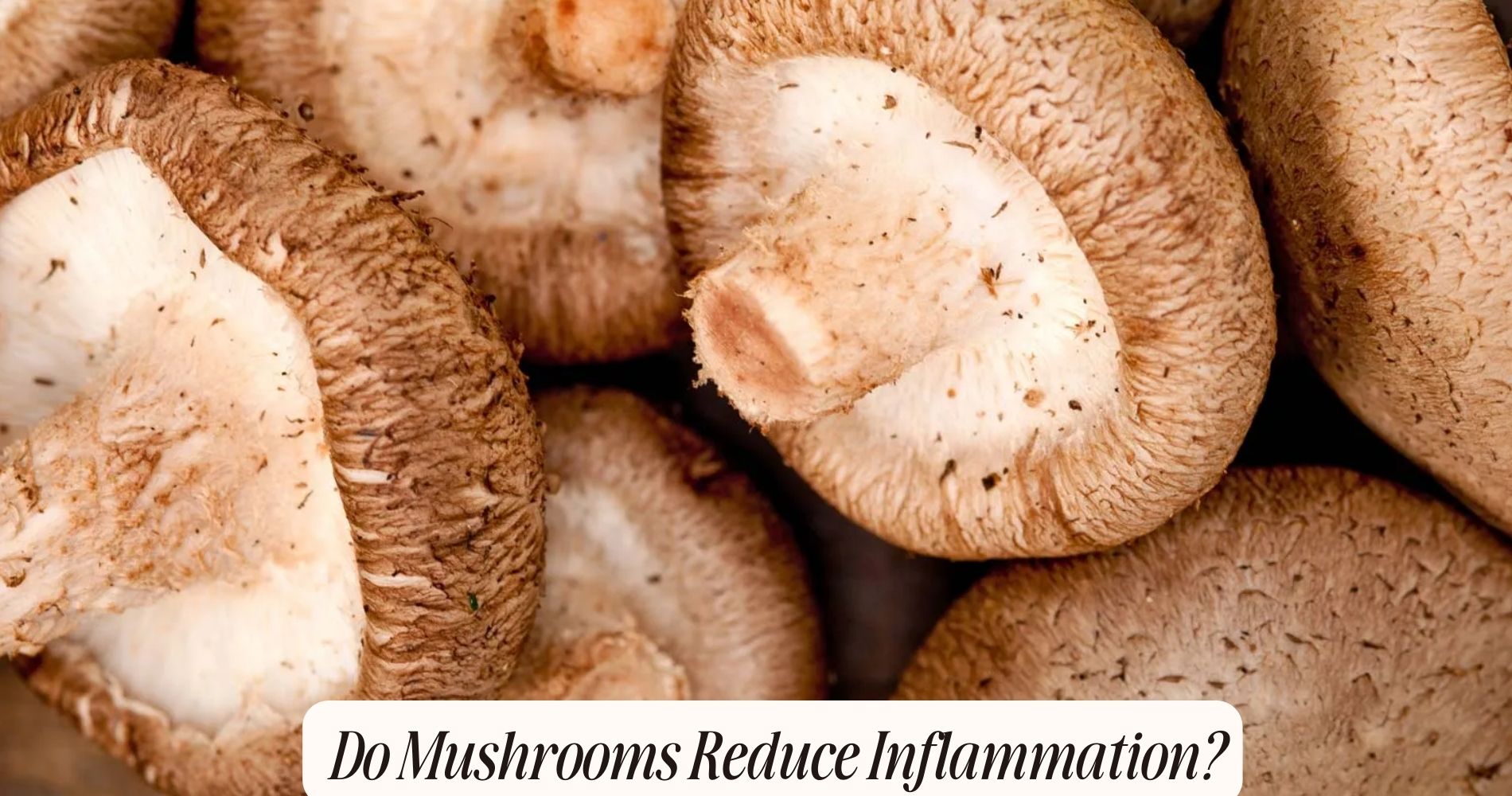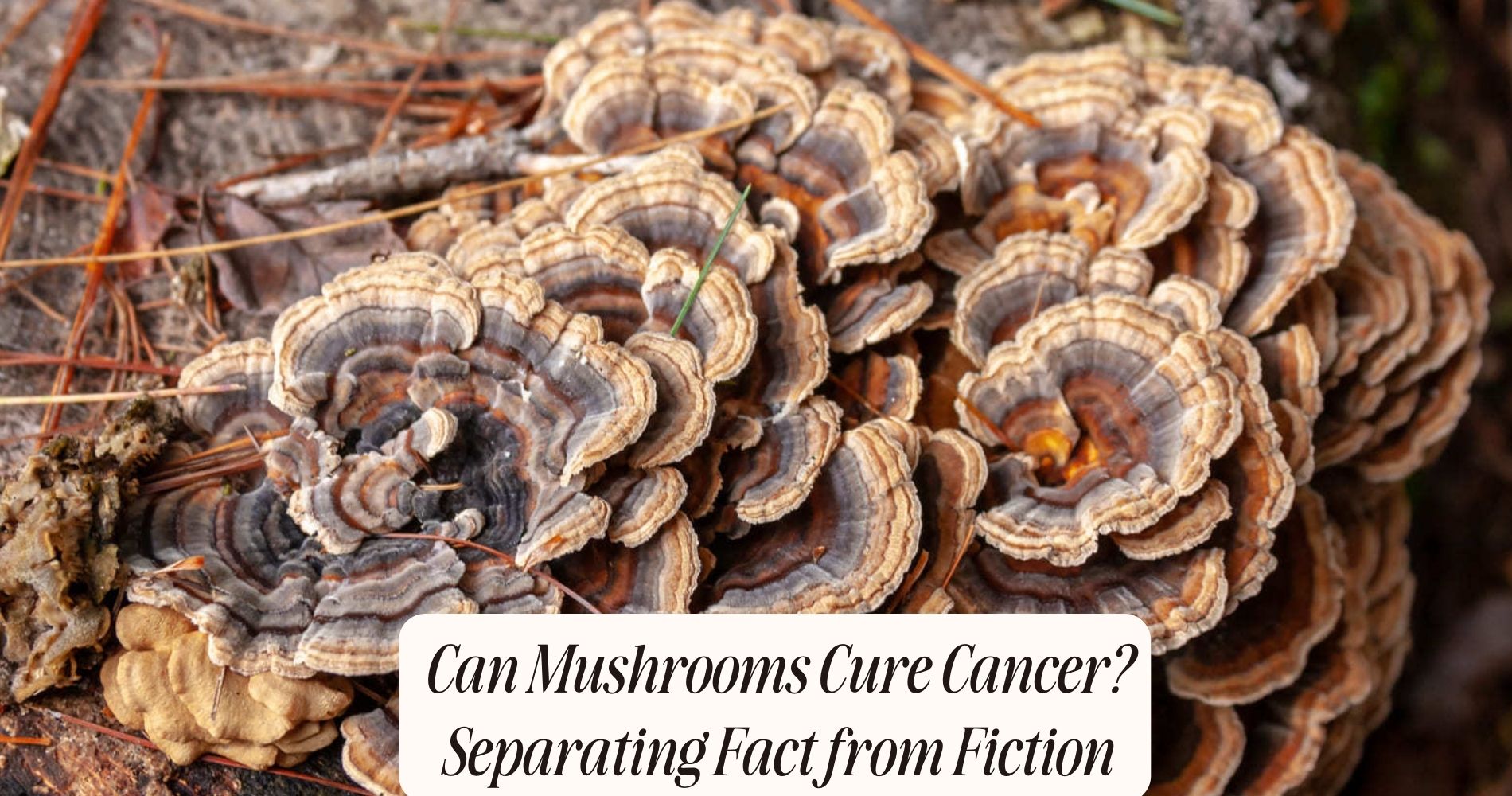
Do Mushrooms Reduce Inflammation?
Do mushrooms reduce inflammation? Yes, mushrooms can reduce inflammation. Rich in bioactive compounds like beta-glucans and ergothioneine, mushrooms help manage inflammation and oxidative stress. Reishi mushrooms, for instance, contain triterpenoids and polysaccharides that inhibit pro-inflammatory cytokines. Shiitake mushrooms boost your immune response with lentinan while reducing chronic inflammation. Lion's Mane and Cordyceps mushrooms offer both anti-inflammatory benefits and cognitive support. By regulating various inflammatory pathways, mushrooms contribute to a healthier inflammatory response. To understand more about specific types of mushrooms and their unique benefits, there's more to explore.
The Science of Inflammation
Inflammation is your body's natural response to injury or infection, characterized by redness, heat, swelling, and pain. It's a critical part of your immune system's defense mechanism. Acute inflammation is short-term and usually subsides once the underlying issue is resolved.
However, chronic inflammation persists over time and can lead to numerous health problems. When inflammation becomes chronic, it can contribute to diseases like heart disease, diabetes, and arthritis. One of the key factors driving chronic inflammation is oxidative stress.
This occurs when there's an imbalance between free radicals and antioxidants in your body, leading to cell damage. Oxidative stress not only exacerbates inflammation but also accelerates the aging process and contributes to the development of chronic diseases.
Your body tries to counteract oxidative stress through various antioxidant mechanisms, but sometimes this isn't enough. Chronic inflammation and oxidative stress often exist in a vicious cycle, each feeding into the other.
Understanding the science of inflammation helps you appreciate why managing it's important for long-term health. Reducing chronic inflammation and oxidative stress can greatly improve your overall well-being and prevent the onset of various inflammatory diseases.
Anti-inflammatory Compounds in Mushrooms
You'll find that mushrooms contain bioactive compounds like polysaccharides and triterpenoids, which play an important role in reducing inflammation. These compounds modulate the production of cytokines, proteins that regulate immune responses.
Active Bioactive Compounds
Mushrooms contain a variety of bioactive compounds, such as polysaccharides and terpenoids, that have been scientifically proven to possess anti-inflammatory properties. Among these, beta glucans stand out due to their notable benefits. These polysaccharides enhance your immune system by activating macrophages and natural killer cells, which play a significant role in reducing inflammation. Research shows that beta glucans can modulate the immune response, thereby decreasing the production of inflammatory cytokines.
Ergothioneine, another significant compound found in mushrooms, also contributes to their anti-inflammatory effects. This unique antioxidant is particularly effective at reducing oxidative stress, which is often a precursor to inflammation. Studies indicate that ergothioneine can protect your cells from damage caused by free radicals, thereby mitigating the inflammatory response.
Polysaccharides and terpenoids aren't the only bioactive compounds in mushrooms. Phenolic compounds and sterols also contribute to their anti-inflammatory properties. These compounds work synergistically to regulate various inflammatory pathways in your body. By incorporating mushrooms into your diet, you can harness these bioactive compounds' diverse mechanisms to combat inflammation effectively.
Impact on Cytokines
Numerous studies have shown that bioactive compounds in mushrooms can greatly influence cytokine production, thereby playing an important role in reducing inflammation. Cytokines are signaling proteins that mediate and regulate immunity, inflammation, and hematopoiesis. When your body is dealing with chronic diseases, the balance of pro-inflammatory and anti-inflammatory cytokines is vital.
Mushrooms like Reishi, Shiitake, and Maitake contain polysaccharides, particularly beta-glucans, that have been proven to modulate cytokine activity. This modulation helps reduce oxidative stress, a key factor in chronic inflammation and various chronic diseases. By lowering oxidative stress, these mushrooms help your body maintain a healthier inflammatory response.

One study highlighted that beta-glucans from mushrooms can significantly decrease the levels of pro-inflammatory cytokines like TNF-α and IL-6 while boosting anti-inflammatory cytokines such as IL-10. This shift in cytokine production can alleviate symptoms of chronic diseases, contributing to overall health.
Moreover, the antioxidants found in mushrooms, such as ergothioneine and selenium, also work to reduce oxidative stress. By incorporating mushrooms into your diet, you can harness their powerful anti-inflammatory properties, potentially mitigating the progression of chronic inflammatory conditions.
Reishi Mushrooms
You might find Reishi mushrooms particularly compelling due to their potent anti-inflammatory properties. Studies show that they contain triterpenoids and polysaccharides, which help reduce inflammation.
Additionally, Reishi mushrooms support your immune system by enhancing the activity of white blood cells.
Anti-Inflammatory Properties
Reishi mushrooms, known scientifically as Ganoderma lucidum, have been shown in several studies to possess potent anti-inflammatory properties. For centuries, traditional medicine practitioners have utilized these mushrooms to treat various ailments, leveraging their natural compounds. Modern research supports these ancient practices, indicating that Reishi mushrooms contain bioactive molecules such as triterpenoids and polysaccharides that help reduce inflammation.
Incorporating Reishi mushrooms into your diet can offer numerous dietary benefits. Studies have demonstrated that these mushrooms can inhibit the production of pro-inflammatory cytokines, which are proteins that signal inflammation in your body. By doing so, they can help alleviate symptoms associated with chronic inflammatory conditions like arthritis and inflammatory bowel disease.

Researchers have also discovered that Reishi mushrooms can modulate inflammation at the cellular level. For instance, they can reduce the activity of nuclear factor-kappa B (NF-κB), a protein complex that plays a pivotal role in regulating immune response and inflammation. By targeting these pathways, Reishi mushrooms offer a natural means to control inflammation without the side effects often associated with pharmaceutical interventions.
Immune System Support
Studies have shown that incorporating Reishi mushrooms into your diet can greatly enhance immune system function. Known for their immune modulation properties, Reishi mushrooms help balance and strengthen your body's defense mechanisms. They contain bioactive compounds like polysaccharides and triterpenoids, which play a vital role in modulating your immune response.
When you consume Reishi mushrooms, these compounds interact with your immune cells, enhancing their activity and efficiency. Polysaccharides, for instance, stimulate the production of cytokines, which are signaling molecules that help regulate immune responses. This means your body becomes better at identifying and attacking harmful pathogens while maintaining a balanced immune state.
Furthermore, Reishi mushrooms have been shown to increase the activity of natural killer (NK) cells, which are essential for targeting virus-infected cells and tumors. By boosting NK cell activity, Reishi mushrooms provide an added layer of protection against various infections and diseases.
Shiitake Mushrooms
Shiitake mushrooms, known for their rich umami flavor, have been shown to possess potent anti-inflammatory properties due to their high concentration of polysaccharides and antioxidants. One of the primary shiitake benefits is their ability to modulate your immune system, which helps reduce chronic inflammation. These mushrooms contain lentinan, a type of polysaccharide that enhances immune response and combats inflammation at the cellular level.
Incorporating shiitake mushrooms into your diet is easy and can be quite enjoyable. Various mushroom recipes, such as shiitake stir-fries, soups, and even grilled shiitake skewers, can add both flavor and health benefits to your meals. Research indicates that the antioxidants found in shiitake mushrooms, such as ergothioneine and selenium, work synergistically to neutralize free radicals, thereby reducing oxidative stress and inflammation.

Moreover, studies have demonstrated that regular consumption of shiitake mushrooms can help lower markers of inflammation like C-reactive protein (CRP). This makes them an excellent dietary choice for those looking to manage inflammation naturally.
Lion's Mane Mushrooms
Just as shiitake mushrooms offer anti-inflammatory benefits, Lion's Mane mushrooms also contribute substantially to reducing inflammation through their bioactive compounds, such as hericenones and erinacines. These compounds are known for their anti-inflammatory properties, which can help mitigate chronic inflammation in the body. By reducing pro-inflammatory cytokines, Lion's Mane mushrooms can play an essential role in managing inflammation-related conditions.
In addition to their anti-inflammatory effects, Lion's Mane mushrooms offer cognitive benefits. Studies have shown that these mushrooms can promote neurogenesis, the process of forming new neurons. This is particularly beneficial for brain health, as it can help improve cognitive functions such as memory and learning. The promotion of neurogenesis is primarily attributed to the presence of erinacines, compounds that stimulate the growth of nerve cells.
When you incorporate Lion's Mane mushrooms into your diet, you're not just reducing inflammation but also supporting brain health. Their dual action of anti-inflammatory effects and neurogenesis promotion makes them a valuable addition to a health-conscious lifestyle.
Cordyceps Mushrooms
Cordyceps mushrooms, renowned for their unique bioactive compounds, offer significant anti-inflammatory benefits that can help support overall health and well-being. These fungi are particularly noted for their ability to modulate the immune system and reduce inflammation. Scientific studies have shown that cordyceps contain polysaccharides, cordycepin, and other bioactive molecules that can inhibit pro-inflammatory cytokines, thereby mitigating chronic inflammation.
Cordyceps cultivation primarily occurs in high-altitude regions, but advancements in biotechnology have enabled their growth in controlled environments, making them more accessible. These cultivated mushrooms retain the same beneficial properties as their wild counterparts, ensuring you receive consistent quality and potency.

In addition to their essential properties, cordyceps are celebrated for providing a natural energy boost. They enhance ATP production in cells, which can improve stamina and reduce fatigue. This makes them particularly beneficial for athletes and individuals seeking to improve their physical performance.
When you incorporate cordyceps mushrooms into your regimen, you're not just addressing inflammation but also supporting your energy levels and overall vitality. The dual benefits make cordyceps a powerful addition to any health-focused diet.
Frequently Asked Questions
Can Cooking Methods Affect the Anti-Inflammatory Properties of Mushrooms?
Yes, cooking methods can affect the anti-inflammatory properties of mushrooms. High cooking temperatures and long cooking durations can degrade beneficial compounds. To retain these properties, use lower temperatures and shorter cooking times.
Are There Specific Mushroom Supplements Recommended for Inflammation?
You should consider Reishi mushrooms and Lion's Mane supplements for inflammation. Studies show Reishi's triterpenes and Lion's Mane's polysaccharides may help reduce inflammation. Consult a healthcare professional before starting any new supplement regimen.
How Do Mushrooms Compare to Traditional Anti-Inflammatory Medications?
When you compare mushrooms to traditional anti-inflammatory medications, pharmaceutical comparisons show mushrooms may offer fewer side effects. However, dosage guidelines aren't as established, so you should consult a healthcare provider before using them as an alternative.
Can Children and Pregnant Women Consume Mushrooms for Inflammation?
You should consult a healthcare provider before adding mushrooms to children's diet or during pregnancy. Limited studies address pregnancy safety and children's consumption for inflammation, so professional guidance guarantees appropriate and safe dietary choices.
Are There Other Natural Foods That Complement Mushrooms' Anti-Inflammatory Effects?
You can complement mushrooms' anti-inflammatory effects with anti-inflammatory fruits like berries and citrus. Herbal teas such as ginger or turmeric tea also provide additional benefits, enhancing your overall anti-inflammatory diet.
Conclusion
Given the evidence, it's clear that incorporating mushrooms like Reishi, Shiitake, Lion's Mane, and Cordyceps into your diet can help reduce inflammation. These mushrooms contain potent anti-inflammatory compounds that can support your overall health.
However, always consider potential side effects and consult with a healthcare professional before making significant dietary changes.
By thoughtfully adding these mushrooms to your meals, you may experience noticeable benefits in managing inflammation.




